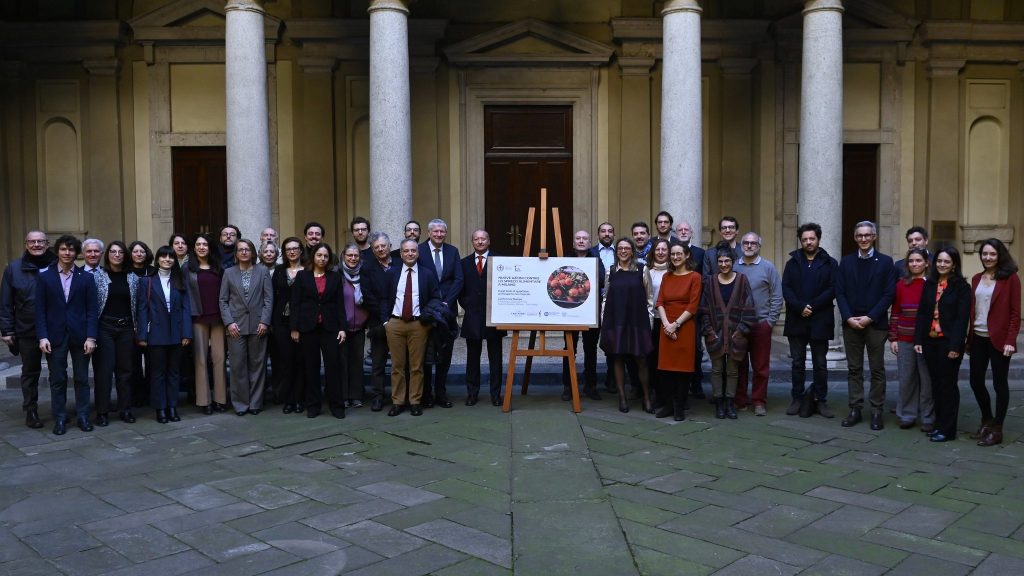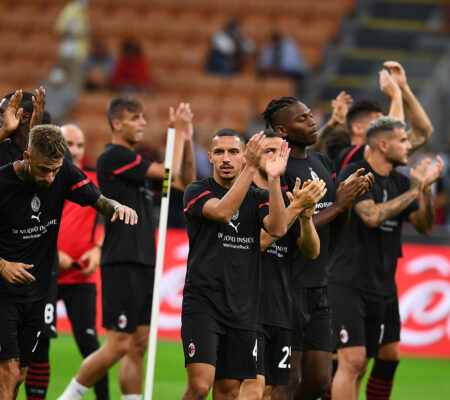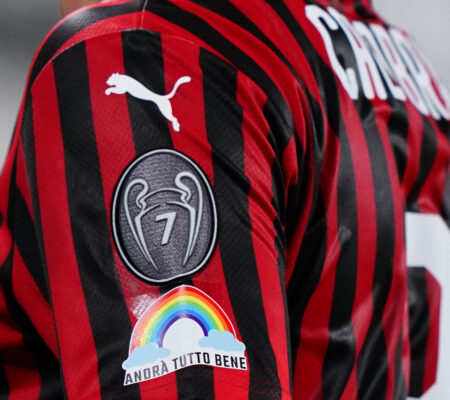
At Palazzo Marino, on the occasion of the National Day of Prevention against Food Waste, the new actions for the strengthening of collection points and the new involvement of the city’s markets were presented.
Milan, 5 February 2024 – The Administration’s commitment in the fight continues to waste: on the occasion of the National Day for Prevention against Food Waste, which is celebrated today, the deputy mayor with responsibility for Food Policy and Agriculture Anna Scavuzzo presented the initiatives implemented in synergy with the city’s partners after the victory of the first edition of the Earthshot Prize 2021, a prestigious international award dedicated to the best solutions to protect the environment. A set of actions that are the result of a year of collective work which involved 36 bodies in the sector and 12 partners including public and private entities, research bodies and companies in workshops, comparisons, needs analyzes and co-planning tables.
“The commitment of the Administration and the City of Milan continues – said the deputy mayor with responsibility for Food Policy Anna Scavuzzo – to combat waste and food poverty, a dual objective that is achieved with a synergistic action that sees in neighborhood hub a very concrete response: the impetus that the Earthshot Prize gave us allowed us to invest resources and co-plan how to use them together with the many subjects active on the Food Policy tables. Once again a good team effort that consolidates a highly effective food aid device in Milan”.

For the British Consul General in Milan, Catriona Graham, “as highlighted by the awarding of the Earthsot Prize, Milan’s Food Policy continues to prove itself at the cutting edge. We hope this partnership will help the City advance the impact of its work to reduce food waste – a critical challenge shared across our planet.”
With the aim, therefore, of reducing food waste and increasingly innovating the methods of recovering food for the most vulnerable, three new neighborhood hubs against food waste will be created in Milan by 2024: this is the Food Hub Cuccagna (Municipality 4), the Selinunte Hub (Municipality 7) and the widespread Hub (Municipality 2), which are added to those already active in the city (Isola Hub, Municipality 9; Lambrate Hub, Municipality 3; Centro Hub , Municipality 1; Gallaratese Hub, Municipality 8 and finally the Foody Zero Waste Hub, created within the Milan fruit and vegetable market).
The experience of neighborhood hubs – launched in 2019 by the Municipality of Milan together with Fondazione Cariplo, Programma QuBì, Assolombarda and Politecnico di Milano to encourage the recovery and redistribution of food surpluses with a territorial network of third sector entities, which they in turn send the food to people and families in difficulty – continues to grow, thus increasing the collection and storage centers for food from various merchants and large-scale retail outlets from five to eight.
“The expansion of the network of neighborhood hubs for the fight against food waste for the benefit of the most vulnerable citizens is an important result for Milan which demonstrates a constant and joint commitment of the Cariplo Foundation, in synergy with the Municipality and all the actors of the city food system. The Food Policy model of Milan, aimed at connecting and enhancing skills, represents a point of reference at an international level as demonstrated by the many awards received in recent years, not least the Earthshot Prize”, explained Carlo Mango, director of the Research area of the Cariplo Foundation.
“The Report of the Waste Watcher International Observatory shows how the total value of food wasted in Italy is over 13 billion euros per year. Continuously growing values, which show how important, in terms of social stability, attention to sustainability and care for the weakest families, initiatives such as ‘Zero Waste’ and the neighborhood hubs that Assolombarda, together with the Polytechnic, the Municipality of Milan and the Cariplo Foundation, have been implementing for several years now – said Adriana Pontecorvo, Group Vice President Food by Assolombarda – An even more central social function in recent months. Ours is an initiative that every year is enriched not only by new centers for the recovery and redistribution of food surpluses, but also by a strong push for innovation , with an increasingly precise mapping of surpluses and an ever-increasing number of companies joining this virtuous example of public-private collaboration. The ‘Zero Waste Hub’ brand, created pro bono by the Armando Testa agency, will increasingly enhance the commitment of the donors of surpluses and the many supporters of the project”.
The anti-waste alliance is also expanding thanks to a greater involvement of municipal markets in which the aim is to collect around 200 kg of surplus fresh produce per day in 20 city markets, a work that adds to that carried out within the Foody Zero Waste Hub. Eco delle Città APS, Associazione Banco Alimentare della Lombardia ‘Danilo Fossati’ ODV, Magma srl Social enterprise, Recup APS, Comunità nuova non-profit organisation, Fondazione Arché and Caritas Ambrosiana.
“Contributing to the reduction of food waste remains among Sogemi’s primary objectives. We are therefore proud to support the initiatives of the Food Policy of Milan, this year with the recovery of over 401 tons of food for the meals of approximately 10,600 people. A result achieved thanks to the precious collaboration and commitment of producers and wholesalers and of the bodies that carry out the collection. The Milan Agri-Food Market represents a strategic node for the Milanese food system and for the entire supply chain, it is therefore essential to continue to support projects and actions of solidarity and food sustainability”, added Cesare Ferrero, President of Sogemi, Milan Agri-Food Market.

Finally, the entire management of the neighborhood hubs will be improved through the digitalisation of the supply chain which will allow for better mapping of surpluses and available resources and shared and integrated logistics capable of optimizing the storage, collection and distribution system, and of finally also reduce the environmental impact.
The numbers Over 615 tons of food recovered in 2023 alone, of which 574 tons from the five Neighborhood Hubs currently active in Milan, to which are added 41 tons from uncovered markets. Hundreds of thousands of surpluses that were redistributed among approximately 27,000 vulnerable people, equivalent to approximately 1,230,000 meals.
“Over the last year, the Neighborhood Hub network has made it possible to increase the quantity of redistributed surpluses, guaranteeing fresh and dry food to an ever-increasing number of people in need in the city of Milan. As a scientific partner of the initiative, in this new year we will work to strengthen and innovate the system, integrating new partners, resources and services, and monitoring their impacts”, declared Raffaella Cagliano, Director of the Department of Management Engineering of the School of Management of the Polytechnic of Milan.
“Our work in the area focuses on three types of poverty: energy, education and food, in support of a Just Transition. Pursuing this aim, we wanted to respond promptly and actively to the co-planning process promoted by the Municipality of Milan for the relaunch of Neighborhood hub – commented Angela Melodia, Head of Development and Innovation and Social and Cultural Redevelopment Projects of the Snam ETS Foundation -. We are convinced that it is essential to proceed with social interventions and inclusive initiatives towards the final beneficiaries, the vulnerable people, placing our resources and our skills at the service of the network actors and the partners involved, with whom we wish to create a system with a view to continuous innovation, with the common objective of generating an increasingly positive social impact”.
The three neighborhood hubs that will be active by 2024 follow a now consolidated model of public-private partnership which involves numerous actors. In particular: – the Cuccagna Food Hub has as its project leader the Cuccagna Social Enterprise Shipyard Consortium Association, to which are added Emergency Ong onlus, Recup Social Promotion Association, Economy and Sustainability Association, Community Association Il Gabbiano ODV and Acra Foundation; – Diffuse hub will see the collaboration of Comin Coop Solidarity Society, Milano Positiva Aps, T12 Lab Association, Santa Maria Assunta Parish in Turro, Terza Settimana Odv, Mutuo Soccorso Milano Aps; – Hub Selinunte, a future logistics hub for food distribution, will finally be managed by Coopi international cooperation onlus.
The partners of the Neighborhood Hubs Supporting bodies: QuBi Program, Fondazione Milan, Banca di Credito Cooperativo di Milano and Fondazione Snam. Managing bodies: Banco Alimentare della Lombardia, Terre des Homme Italia, Ibva Solidando. Foody Zero Waste Hub: Sogemi, Cariplo Foundation, University of Milan, Lombardy Food Bank, Recup, Southern Milan Red Cross, Eco dalle Città, Caritas Ambrosiana, Italian Red Cross Milan Committee Technical sponsors: Avis Milan, SoDe social delivery , Armando Testa. The brands involved: Lidl, Esselunga, Carrefour, Coop Lombardia, Il Gigante, Natura Sì, Iper La grande i, Unes, Getir, Pam, Erbert, Conad, Glovo, with 37 total sales points.


